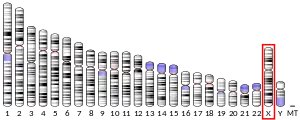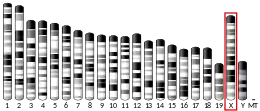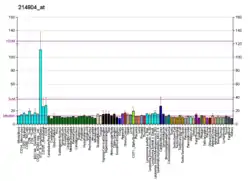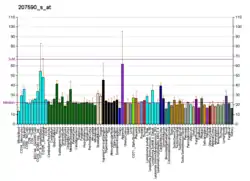CENPI
Centromere protein I is a protein that in humans is encoded by the CENPI gene.[5][6]
| CENPI | |||||||||||||||||||||||||
|---|---|---|---|---|---|---|---|---|---|---|---|---|---|---|---|---|---|---|---|---|---|---|---|---|---|
| Identifiers | |||||||||||||||||||||||||
| Aliases | CENPI, CENP-I, FSHPRH1, LRPR1, Mis6, centromere protein I | ||||||||||||||||||||||||
| External IDs | OMIM: 300065 MGI: 2147897 HomoloGene: 4899 GeneCards: CENPI | ||||||||||||||||||||||||
| |||||||||||||||||||||||||
| |||||||||||||||||||||||||
| |||||||||||||||||||||||||
| |||||||||||||||||||||||||
| Orthologs | |||||||||||||||||||||||||
| Species | Human | Mouse | |||||||||||||||||||||||
| Entrez | |||||||||||||||||||||||||
| Ensembl | |||||||||||||||||||||||||
| UniProt | |||||||||||||||||||||||||
| RefSeq (mRNA) | |||||||||||||||||||||||||
| RefSeq (protein) | |||||||||||||||||||||||||
| Location (UCSC) | Chr X: 101.1 – 101.16 Mb | Chr X: 134.31 – 134.36 Mb | |||||||||||||||||||||||
| PubMed search | [3] | [4] | |||||||||||||||||||||||
| Wikidata | |||||||||||||||||||||||||
| |||||||||||||||||||||||||
Function
The product of this gene is involved in the response of gonadal tissues to follicle-stimulating hormone. This gene is also a potential candidate for human X-linked disorders of gonadal development and gametogenesis.[6] CENPI is a target gene of the transcription factor E2F.[7] Additionally, CENPI expression is increased in breast cancer and this has been shown to cause chromosome instability in breast cancer cells.[7]
References
- GRCh38: Ensembl release 89: ENSG00000102384 - Ensembl, May 2017
- GRCm38: Ensembl release 89: ENSMUSG00000031262 - Ensembl, May 2017
- "Human PubMed Reference:". National Center for Biotechnology Information, U.S. National Library of Medicine.
- "Mouse PubMed Reference:". National Center for Biotechnology Information, U.S. National Library of Medicine.
- Okada M, Cheeseman IM, Hori T, Okawa K, McLeod IX, Yates JR, Desai A, Fukagawa T (May 2006). "The CENP-H-I complex is required for the efficient incorporation of newly synthesized CENP-A into centromeres". Nature Cell Biology. 8 (5): 446–57. doi:10.1038/ncb1396. PMID 16622420.
- "Entrez Gene: CENPI centromere protein I".
- Thangavelu PU, Lin CY, Vaidyanathan S, Nguyen TH, Dray E, Duijf PH (September 2017). "CENPI promotes chromosome instability and predicts poor prognosis in estrogen receptor-positive breast cancer". Oncotarget. 8 (37): 62167–62182. doi:10.18632/oncotarget.19131. PMC 5617495. PMID 28977935.
Further reading
- Izuta H, Ikeno M, Suzuki N, Tomonaga T, Nozaki N, Obuse C, Kisu Y, Goshima N, Nomura F, Nomura N, Yoda K (June 2006). "Comprehensive analysis of the ICEN (Interphase Centromere Complex) components enriched in the CENP-A chromatin of human cells". Genes to Cells. 11 (6): 673–84. doi:10.1111/j.1365-2443.2006.00969.x. PMID 16716197.
- Foltz DR, Jansen LE, Black BE, Bailey AO, Yates JR, Cleveland DW (May 2006). "The human CENP-A centromeric nucleosome-associated complex". Nature Cell Biology. 8 (5): 458–69. doi:10.1038/ncb1397. PMID 16622419.
- Nousiainen M, Silljé HH, Sauer G, Nigg EA, Körner R (April 2006). "Phosphoproteome analysis of the human mitotic spindle". Proceedings of the National Academy of Sciences of the United States of America. 103 (14): 5391–6. doi:10.1073/pnas.0507066103. PMC 1459365. PMID 16565220.
- Obuse C, Yang H, Nozaki N, Goto S, Okazaki T, Yoda K (February 2004). "Proteomics analysis of the centromere complex from HeLa interphase cells: UV-damaged DNA binding protein 1 (DDB-1) is a component of the CEN-complex, while BMI-1 is transiently co-localized with the centromeric region in interphase". Genes to Cells. 9 (2): 105–20. doi:10.1111/j.1365-2443.2004.00705.x. PMID 15009096.
- Liu ST, Hittle JC, Jablonski SA, Campbell MS, Yoda K, Yen TJ (April 2003). "Human CENP-I specifies localization of CENP-F, MAD1 and MAD2 to kinetochores and is essential for mitosis". Nature Cell Biology. 5 (4): 341–5. doi:10.1038/ncb953. PMID 12640463.
- Roberts RG, Kendall E, Vetrie D, Bobrow M (October 1996). "Sequence and chromosomal location of a human homologue of LRPR1, an FSH primary response gene". Genomics. 37 (1): 122–4. doi:10.1006/geno.1996.0528. PMID 8921378.
- Slegtenhorst-Eegdeman KE, Post M, Baarends WM, Themmen AP, Grootegoed JA (February 1995). "Regulation of gene expression in Sertoli cells by follicle-stimulating hormone (FSH): cloning and characterization of LRPR1, a primary response gene encoding a leucine-rich protein". Molecular and Cellular Endocrinology. 108 (1–2): 115–24. doi:10.1016/0303-7207(94)03468-9. hdl:1765/64471. PMID 7758824.
- Adams MD, Dubnick M, Kerlavage AR, Moreno R, Kelley JM, Utterback TR, Nagle JW, Fields C, Venter JC (February 1992). "Sequence identification of 2,375 human brain genes". Nature. 355 (6361): 632–4. doi:10.1038/355632a0. PMID 1538749.
This article is issued from Wikipedia. The text is licensed under Creative Commons - Attribution - Sharealike. Additional terms may apply for the media files.





